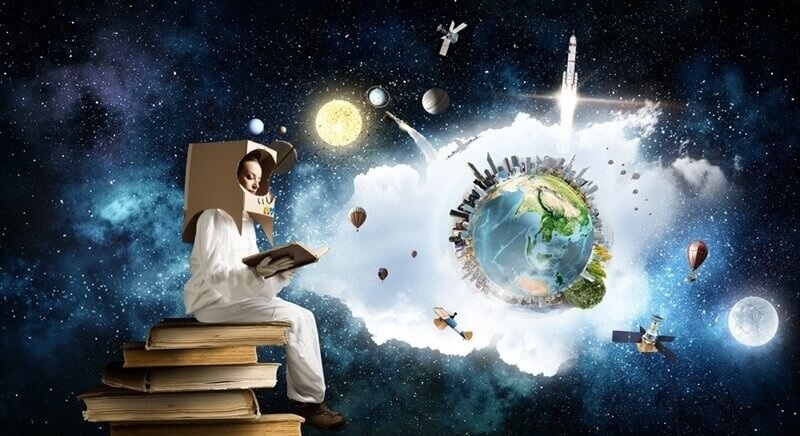
Science fiction novels have remained beyond the limits of the wildest imaginations for decades, elaborating on futuristic universes, ultramodern gadgets, and alternative cultures. Previously were the tales about space missions, while nowadays they relate their authors' views in subtle ways. Despite that one may be a beginner and another one a veteran of the genre, the following list shows outstanding and ever-changing kind of sci-fi books.
The following books bring new readers a somewhat easier approach to science fiction with intriguing plots that at the same time serve as an introduction to the genre.
The novel, Ender's Game, is a story about a young boy growing into his personality in a distant future where kids of incredibly high IQ are trained to protect mankind from a hypothetical extra-terrestrial enemy. The novel, through command, and control theory, gets personal, and at the same time, it keeps the action going, making the novel a very alluring read for science fiction beginners.
The Martian revolves around astronaut Mark Watney, who found himself in a scenario where he had to fight for his life on Mars without any support. While impressing the hardcore science audience with lightheartedness and tension at the same time, the novel’s hard science serves as a vehicle for its plot.
This action-packed adventure immerses readers in a virtual world filled with riddles, obstacles, and references from popular culture. Through a pleasant and understandable way, Ready Player One exposes virtual reality and futuristic technologies concepts, finally, as it makes clear, not only to experts.
“Cinder” is a science fiction-fantasy hybrid, a futuristic re-imagining of Cinderella that incorporates androids, advanced robotics, and space-related treasons. Despite its mixture of sci-fi and fantasy elements, it is a good match for someone who is unfamiliar with the genre and wants to try it out.
Retro sci-fi books were the baseline of modern storytelling, attracting fans with their imaginative characters and those thought-provoking topics.
The story of Dune is an interplay of politics, religion, and ecology on the desert planet of Arrakis. Its elaborate world-building, multi-dimensional characters, and philosophical profundity have forever changed the course of science fiction.
Neuromancer brought forth the cyberpunk concept along with the portrayal of a future in which large corporations, hackers, and AI dominate. It painted the scene of technology and virtual space in a way that turned the most recent trends of sci-fi to reconsider how they envisioned future societies.
Asimov’s Foundation series is a study of the cycle of civilization’s evolution through sociological prediction. Firstly, there is an interweaving of historical, philosophical, and scientific threads; secondly, it displays the genre’s potential for intellectual complexity and invention.
Huxley’s dark utopian tale centers on issues of standardization, machines, and societal dominance. “Brave New World” is still talked about for its harsh take on social systems and its putting of the human psyche under the microscope in a futuristic context.

Feminist science fiction authors have been dealing with gender, equality, and social order issues through intriguing plots.
The Handmaid’s Tale is set in a dystopian world where women have lost their rights. Thrown in with the thrill comes the criticism of the writer, who constantly probes at the connection between gender and power.
“Kindred” equalizes modern sci-fi and historical fiction as an African-American woman from the present day goes back to early America before the Civil War. Through a speculative lens, the book discusses themes of slavery, social injustice, and the struggle of identity.
Le Guin creates a world where gender is fluid, delving into identity, society, and relationships. The novel is a mix of social commentary and an intriguing, character-focused sci-fi novel.
The near-future world of Parable of the Sower is characterized by increasingly miserable environmental and societal crises as the book invokes both creativity and high social consciousness, illustrating the power of the genre to query the human condition.
The latest sci-fi releases go beyond frivolity, exploring and interrogating some of the real-life issues we face today. Themes include climate change, AI ethics, space travel, and social issues, among others.
This book moves both back and forth through time, hardly human beings through technology and nature to be its theme. Mandel merges the two genres, literary fiction and sci-fi, providing a thoughtful and creative narration.
Dead Silence is a mix of a thrilling story, the exploration of space, and weird phenomena happening on a ship. This is a modern sci-fi that is full of adventure and psychological tension at the same time.
Through the outline of the future of terraforming, Newitz tackles environmental issues, alongside the oxygenation of other planets and humanity's ability to sustain life. Aside from the storyline of a scientific breakthrough, the novel also discusses a series of social changes in a very distant future timeline.
Ann Leckie’s book tells of the off-earth political, AI-human integration, conspiracy, and other matters. She has been recognized for her nuanced character depiction and imaginative world-building.
In Chambers' story, the optimism and exploration are not missing, even though it is set in a world after robots have been built. To be specific, she focuses on relationships, community, ethical issues, and the character-driven side of the genre.
While launching an energetic and fast-paced space saga, Roanhorse still manages to skillfully incorporate the theme of identity, speculations of the culture, and interstellar diplomacy in her novel. The pacing of the book moves from action to social reflective commentary.
One can categorize science fiction into two major types - hard and soft science fiction - and accompany this knowledge with one's own preference for reading.
Hard science fiction works closely with scientific accuracy, advanced technology, and thought-out solutions. The survival of the Mars mission is depicted in reality through engineering and chemistry in The Martian.
Soft sci-fi puts more emphasis on characters, societies, and speculative ideas rather than precise scientific detailing. Le Guin's book deals with social structures, personal identities, and relationships in a futuristic world.
Some readers find joy in combining the two approaches, admiring not only the scientific rigor of hard sci-fi but also the richness of soft sci-fi themes.
Through the creation of worlds unlike ours, sci-fi poses questions about ethics, society, science, and human capacity. While envisioning AI, space travel, or utterly different societies, these books appeal intellectually and emotionally.
Beginning authorships, old classics, feminist sci-fi, or the latest published works have all had one thing in common – science fiction books radically change and continue to do so. Learning about hard versus soft sci-fi helps the reader to understand the genre, and by exploring a variety of themes, the experience is further enriched.
These books invite readers to think bigger, deeper, and more imaginatively than with the present world, which has turned sci-fi into a necessary and inspiring part of literature.
This content was created by AI